A major car show biennial was opened by the German Chancellor on Tuesday, but his boosterism for national industry was upstaged first by the soaring presence of Asian-made electric cars, and then by the actions of eco-extremists accusing the industry of “greenwashing” their economic impact.
Three separate environmental campaign groups targeted a major trade fair in Germany, upstaging the arrival of the pirate-eyepatch-wearing German leader, who called the presence of the protesters “irritating”.
Greenpeace activists stood on top of display models and unfurled banners in front of German Chancellor Olaf Scholz on Tuesday at the Internationale Automobil-Ausstellung (IAA, International Car Show) in Munich, one of if not the largest auto industry show on earth. As the Chancellor sat grinning inside an experimental electric car at the BMW pavilion, a protester claimed on top of a car and unfurled a “The Party is Over” banner. Meanwhile, a co-conspirator addressed the crowd through a megaphone, accusing the car industry of producing ever-heavier automobiles that were worse for the planet, reports Die Welt.
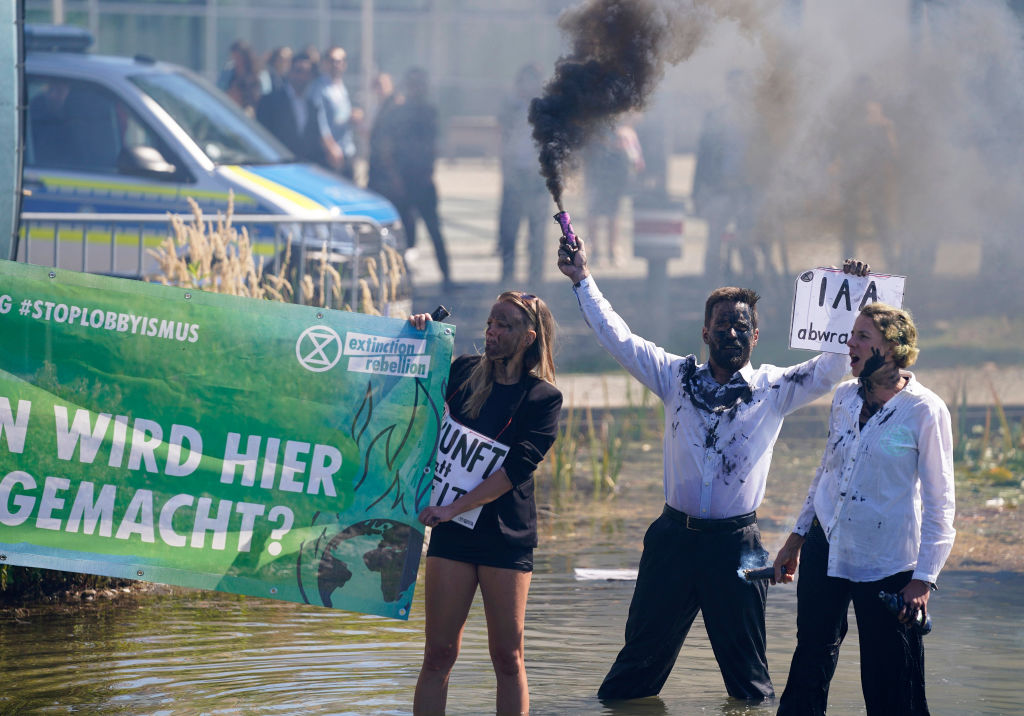
05 September 2023, Bavaria, Munich: Activists of the organization Extinction Rebellion protest on the sidelines of the car and transport fair IAA and have lit smoke flares. The International Motor Show IAA Mobility 2023 will be held in Munich from 05 to 10 September. Photo: Uwe Lein/dpa (Photo by Uwe Lein/picture alliance via Getty Images)
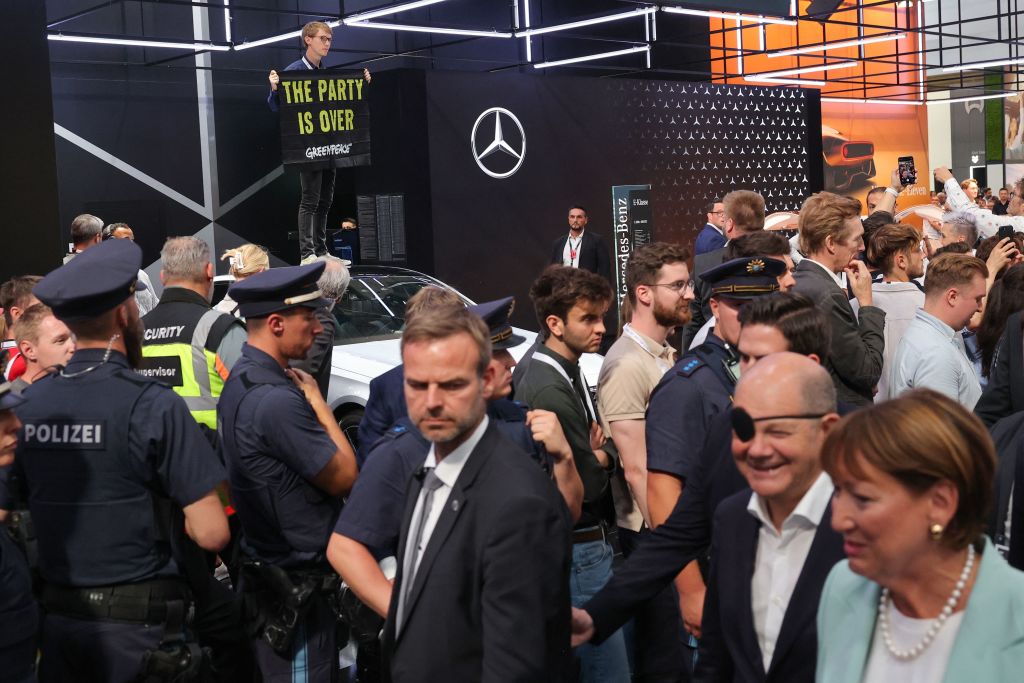
German Chancellor Olaf Scholz (2nd R), wearing an eyepatch after injuring his face while jogging, smiles while an environmental activist of Greenpeace (L) holds up a banner which reads “The party is over” at the booth of German car maker Mercedes-Benz at the International Motor Show (IAA) in Munich, southern Germany, on September 5, 2023. Germany’s IAA MOBILITY auto show, one of the world’s largest, will be open for the public from September 5 to 10, 2023 and showcase all car-related topics. (Photo by Yann Schreiber / AFP) (Photo by YANN SCHREIBER/AFP via Getty Images)
Not long afterwards, as Scholz visited the Mercedes stand, more protesters emerged from the crowd and again unfurled a banner from on top of a car, and shouted through a megaphone. This time, the group appealed to the Chancellor to support the building of more public transport instead of the automobile industry. Reports state around a dozen Greenpeace members were involved and in at least one case a protester was forcefully rushed away by police.
There was a heavy police presence with dogs at the Volkswagen stand, the final on Scholz’s tour, and that appears to have gone ahead unmolested.
At the heart of the disagreements appears to be differences in whether battery-electric cars are really helping the environment. While protesters accused the car industry of ‘greenwashing’, Scholz said the activists were standing in the way of progress. He is reported to have remarked after navigating the banners and megaphones: “Protests are part of public and democratic debate … but it is a little anachronistic. If you walk through these stands and see the new technologies… to make mobility have less or no emissions in future, it is a bit irritating.”
These high-profile demonstrations for the Chancellor and the lenses of his attendant photographers were not the only protests at the motor show, however. ‘Attac Deutschland’ staged their own protest outside, “symbolically” setting fire to an enormous pair of cardboard numbers they say represent a 1.5-degree centigrade increase in global temperatures the car industry is helping cause.
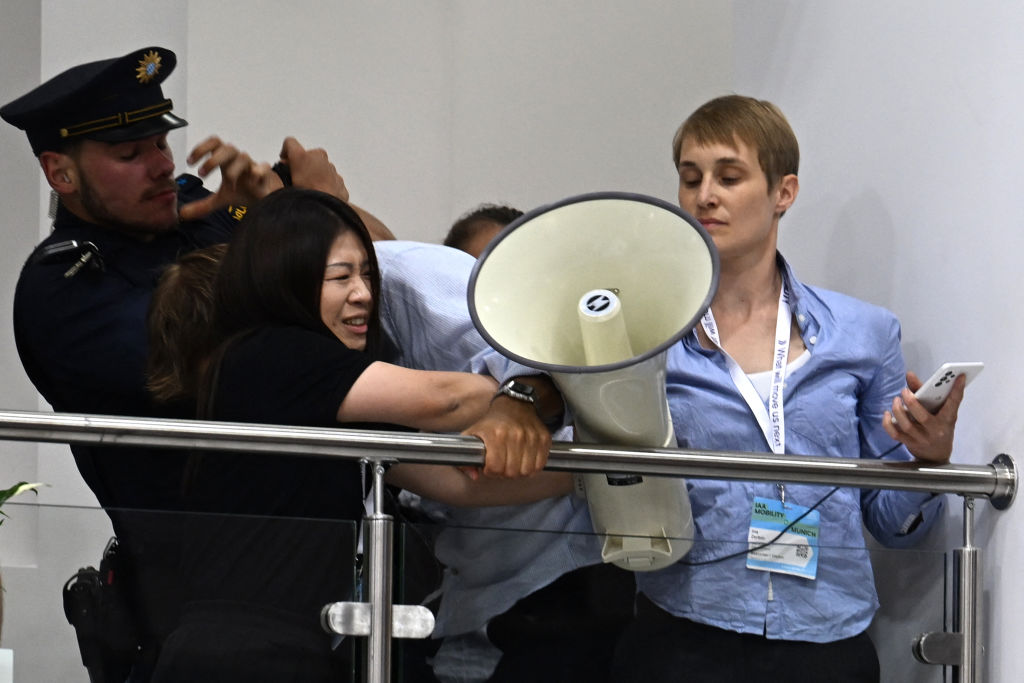
Environmental activists of Greenpeace demonstrate at the German car maker BMW booth at the International Motor Show (IAA) in Munich, southern Germany, on September 5, 2023. Germany’s IAA MOBILITY auto show, one of the world’s largest, will be open for the public from September 5 to 10, 2023 and showcase all car-related topics. (Photo by CHRISTOF STACHE / AFP) (Photo by CHRISTOF STACHE/AFP via Getty Images)
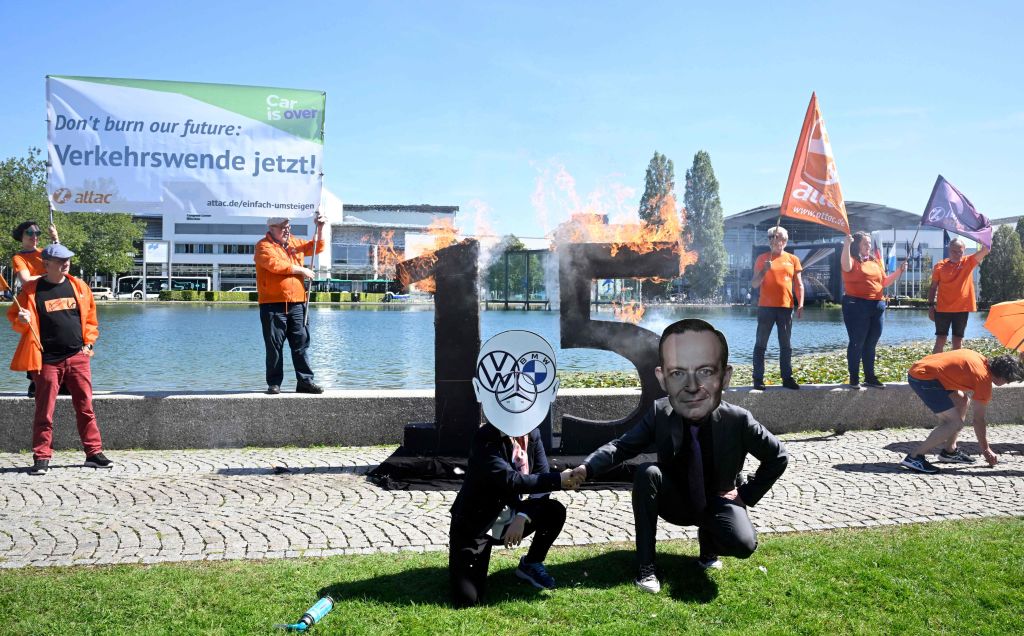
Activists wearing masks of German Minister for Transport and Digital Affairs Volker Wissing (R) and with the logos of German car makers Volkswagen (VW), BMW and Mercedes-Benz, pose next to a burning sculpture symbolising the 1,5 degrees Celsius global warming limiting target, as they protest close to the venue of the International Motor Show (IAA) in Munich, southern Germany, on September 5, 2023. Germany’s IAA MOBILITY auto show, one of the world’s largest, will be open for the public from September 5 to 10, 2023 and showcase all car-related topics. (Photo by Tobias SCHWARZ / AFP) (Photo by TOBIAS SCHWARZ/AFP via Getty Images)
The group claims Germany has a “car fetish” and that the car industry has co-opted “right-wing influencers” and “privileged white men” to serve their own political ends.
Yet another group also targeted the IAA on Tuesday, with Extinction Rebellion — well known in the United Kingdom for its road-blocking protests — climbed into the ornamental lake outside the conference centre on Tuesday to light smoke bombs and hold a banner. And that was not the only demo for that body of water, which the day before had car body parts pushed into it by Greenpeace alongside banners reading ‘sink now or sink later’.
As observed by German automotive journalist Victoria Waldersee, such a large number of protests is now “to be expected” at large car events, as green protesters focus their energy on the industry. But if these protests weren’t enough, the show was already overshadowed as it began by the changing nature of the show, and with ever more Asian competitors edging out the European luxury car makers that once dominated.
A major share — 41 per cent — of the exhibitors at the show are Asian businesses, Reuters reports, and Chinese electric vehicle sales have shot up 55 per cent just this year alone, accounting for 13 per cent of European car sales. The service reports that Chinese cars benefit from being cheaper and “more consumer-friendly”, with Chinese car makers benefitting from having gotten into the battery business years ahead of European rivals.
German car industry lobbyist Hildegard Müller outlined some of the areas in which Europe had to improve to compete with China at the IAA, remarking: “There is a whole range of challenges that now need to be addressed urgently and sustainably: the high energy prices, the high taxes, the lack of digital infrastructure and digital administration, the sprawling bureaucracy – all of this is putting increasing strain on companies.”
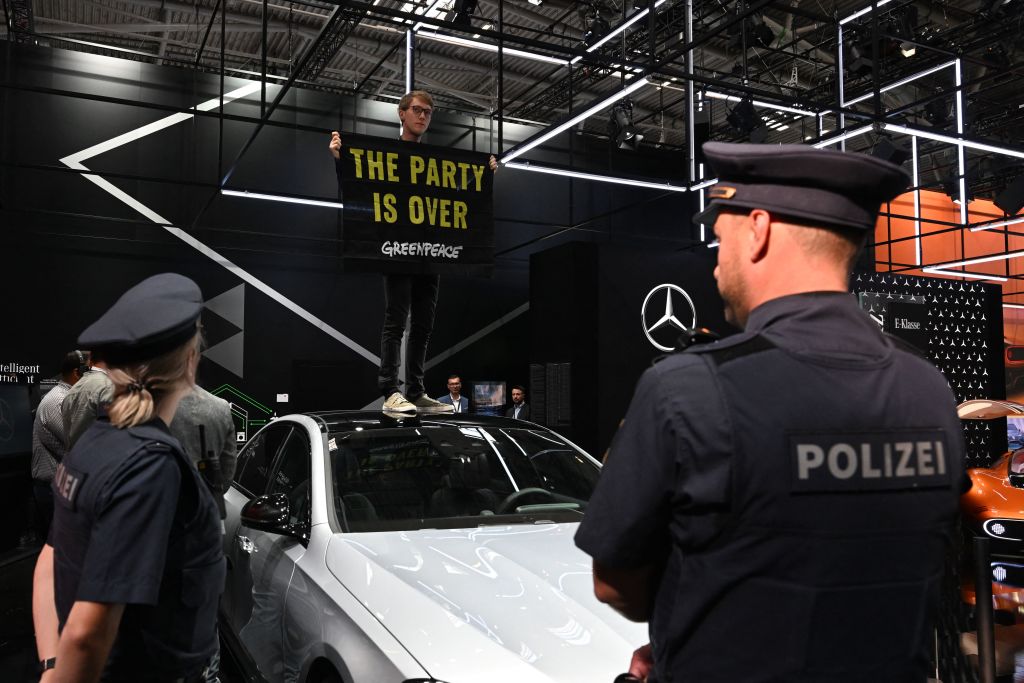
An environmental activist of Greenpeace demonstrates at the booth of German car maker Mercedes-Benz at the International Motor Show (IAA) in Munich, southern Germany, on September 5, 2023. Germany’s IAA MOBILITY auto show, one of the world’s largest, will be open for the public from September 5 to 10, 2023 and showcase all car-related topics. (Photo by CHRISTOF STACHE / AFP) (Photo by CHRISTOF STACHE/AFP via Getty Images)
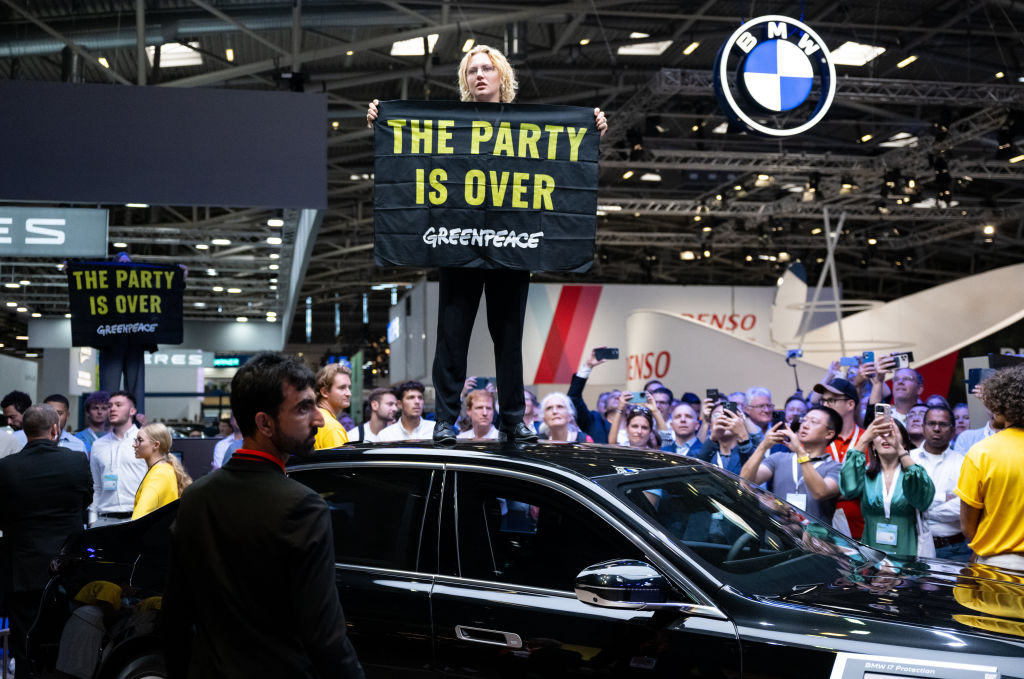
05 September 2023, Bavaria, Munich: A Greenpeace activist stands on the roof of a car on display at the BMW stand during the opening of the IAA, holding up a poster with the slogan “The Party is over”. The International Motor Show IAA MOBILITY 2023 will take place in Munich from September 05-10. Photo: Sven Hoppe/dpa (Photo by Sven Hoppe/picture alliance via Getty Images)


